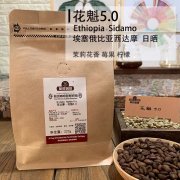Which would you like to have latte beans? What's so unique about the coffee beans that must be deep-roasted with concentrated coffee?
With the advent of products such as single-origin and full-baked products, buying espresso beans is actually more complicated than in the past. Now Qianjie will tell you what you want to know about espresso beans.
What's so unique about espresso beans?

Most cafes use blended beans to make espresso, not just regular coffee, for several reasons:
Tradition: espresso has always been roasted deeper than other types of coffee. People began to expect an "espresso flavor" that ordinary coffee beans could not achieve.
Milk works better: if you want to use espresso in milk drinks such as lattes or cappuccinos, you need to roast quite deeply to eliminate the fishy smell of the milk.
It's cheaper: coffee from a single source is expensive. For this reason, it makes sense to use espresso mixtures in busy cafes. Usually, cheap beans from countries such as Brazil and Indonesia are mixed. May even be mixed with 20% robusta coffee beans.
There are four kinds of Italian coffee beans in Qianjie: warm sun mix, boutique coffee mix, basic mix and commercial mix. The commercial mix contains 10% of Luodou. The first goal is to reduce costs and the second is to increase the fat of coffee.
Should espresso be deep-roasted?

Yes, espresso should be at least a little darker than regular coffee beans. This is a tradition and what most people like.
The debate between Arabica Coffee and Robusta Coffee can be very heated and complex. Because of the stereotyped influence, I used to think that Robusta coffee is not as good as Arabica coffee, but in recent years I have changed my mind. From a natural point of view, robusta coffee has lower sweetness and acidity than Arabica coffee. It tastes different and is somewhat rougher (but it also contains more caffeine and produces more oil, so this is positive for some people. When it comes to espresso, it doesn't need much acidity, and for this reason, the Robusta beans grown in the party can actually be tasted as the source of espresso. This species naturally contains more caffeine and produces more espresso oil than Arabica coffee.
Important Notice :
前街咖啡 FrontStreet Coffee has moved to new addredd:
FrontStreet Coffee Address: 315,Donghua East Road,GuangZhou
Tel:020 38364473
- Prev

Characteristics of growing Environment of Coffee Bean Mountain Spring processing method Sidamo Fakui Coffee in Ethiopia
The area is more than 2000 meters above sea level. Few plantations are located at this altitude, which is why this naturally processed coffee has a rich fruity flavor and a sweet return of sugar. Huakui in Qianjie is from Shanquan treatment plant.
- Next

Hand-brewing coffee teaching: how does the size of hand-brewing three-stage ring water injection affect coffee flavor performance
Whether a cup of hand-brewed coffee tastes good or not has a lot to do with not only the beans themselves but also the mood / mood of brewing. Mood can not directly change the flavor of coffee, but can change the control of water flow during brewing and the speed of circling. When you are impatient / impatient, you will want to finish quickly, and then speed up the current and circle speed.
Related
- Detailed explanation of Jadeite planting Land in Panamanian Jadeite Manor introduction to the grading system of Jadeite competitive bidding, Red bid, Green bid and Rose Summer
- Story of Coffee planting in Brenka region of Costa Rica Stonehenge Manor anaerobic heavy honey treatment of flavor mouth
- What's on the barrel of Blue Mountain Coffee beans?
- Can American coffee also pull flowers? How to use hot American style to pull out a good-looking pattern?
- Can you make a cold extract with coffee beans? What is the right proportion for cold-extracted coffee formula?
- Indonesian PWN Gold Mandrine Coffee Origin Features Flavor How to Chong? Mandolin coffee is American.
- A brief introduction to the flavor characteristics of Brazilian yellow bourbon coffee beans
- What is the effect of different water quality on the flavor of cold-extracted coffee? What kind of water is best for brewing coffee?
- Why do you think of Rose Summer whenever you mention Panamanian coffee?
- Introduction to the characteristics of authentic blue mountain coffee bean producing areas? What is the CIB Coffee Authority in Jamaica?

